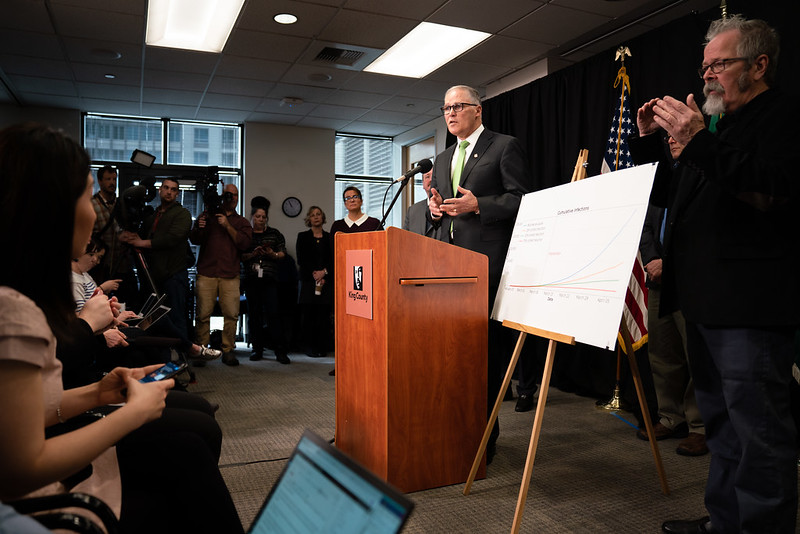
By By: Elaine S. Povich, Stateline
Governors of both parties are taking charge of the coronavirus pandemic, setting up rules and plans for their states as federal officials scramble to keep up.
They’re also raising their political profiles as they become the go-to authorities for citizens.
Governors were the first to limit gatherings to specific numbers of people, the first to shut down businesses and community programs, and the first with information while the president and his aides put out sometimes inaccurate updates.
The governors’ actions have transcended party. Republicans such as Charlie Baker in Massachusetts, Mike DeWine in Ohio and Larry Hogan in Maryland, as well as Democrats including Andrew Cuomo in New York and Gavin Newsom in California have taken the lead in getting health care and information to constituents.
With notable exceptions (Oklahoma Gov. Kevin Stitt, a Republican, last weekend tweeted he took his family to a mall food hall), most have counseled their state residents to stay home and avoid meeting other people.
“I do think that the governors moved out more efficiently than the federal government did, particularly the president and the administration,” said Bob Griffin, dean of the College of Emergency Preparedness, Homeland Security and Cybersecurity at the State University of New York Albany. “Particularly Illinois and New York, and Newsom did a decent job in California. Look at what you see even from Alabama, Washington — the states have taken the lead.”
“The buck stops on my desk. I assume full responsibility.”
Andrew Cuomo, Democratic Governor New York
For example, within the first 11 days of March, Republican governors in eight states — Arizona, Arkansas, Florida, Indiana, Iowa, Maryland, Ohio and Utah — all declared a state of emergency. A dozen Democratic governors also had taken that step by then. President Donald Trump declared a national emergency March 13.
The Federal Housing Administration on Wednesday suspended foreclosures. Many governors already had moved to do that, including Democrats Newsom in California and Laura Kelly in Kansas. Republican New Hampshire Gov. Chris Sununu on Tuesday banned evictions and foreclosures and barred utilities from disconnecting customers, as part of a sweeping emergency package.
Griffin said governors like Cuomo, DeWine and J.B. Pritzker of Illinois, a Democrat, are “much more aligned with where the nation needs to be. They are sending a message that, ‘This is important. But be calm, and we can get through it.’”
Cuomo held a news conference March 17 to explain why he ordered businesses, restaurants and other operations to close. It was not, he said, local officials’ responsibility, it was his. “Be upset at me,” he said. “The buck stops on my desk. I assume full responsibility.”
Trump held a news conference March 13 to declare the national emergency. Asked by a reporter if he should take responsibility for the inability of the federal government to distribute more coronavirus tests earlier, Trump said: “I don’t take responsibility at all.”
“Gov. Cuomo moved relatively quickly on this and has been pretty much spot on,” said Griffin, who served in the U.S. Department of Homeland Security in 2010-2017. “Even in things he was criticized for initially, like the National Guard helping in New Rochelle,” the area declared a containment zone because of an outbreak.
Kathleen Hall Jamieson, director of the University of Pennsylvania’s Annenberg Public Policy Center, said in an email that governors of both parties are showing leadership that could help them politically.
“Many of the nation’s governors are demonstrating that they know how to act decisively and well in times of crisis,” she said. “A person from Mars observing the rhetoric and actions of our leaders would reasonably assume that Andrew Cuomo is the president.”
Trump repeatedly bashed governors, especially Democrats, in the early days of the crisis, referring to Michigan Gov. Gretchen Whitmer as “failing” and hitting Cuomo for urging more federal assistance. But he backed off several days later and appeared to have patched things up with Cuomo.
Some of the federal government’s inability to act stems from federalism itself: States have powers not found in the national government, over schools, for example, and voting. The federal government cannot change election dates or voting processes; that is a state function.
Ohio postponed its March 17 primary, but other states held theirs. Some states are looking into voting by mail.
Oregon and Washington already run entirely vote-by-mail elections. Even before the coronavirus outbreak, Oregon Gov. Kate Brown had been chairing a committee of the Democratic Governors Association on expanding the practice to more states.
Stateline, an initiative of The Pew Charitable Trusts.


